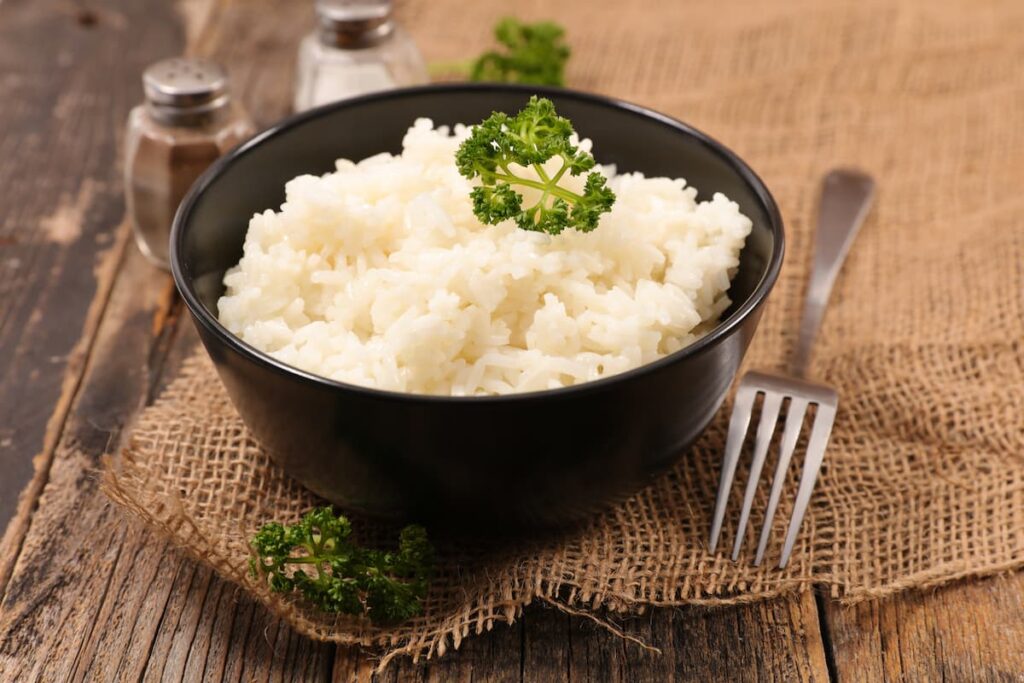Can Birds Eat Cooked Rice?
If you have a bird table in your garden, you might have noticed that your feathered friends aren’t shy about letting you know when they are hungry. When they bob their heads with enthusiasm, you can be sure that their tiny tummies are rumbling! But what if you’ve run out of birdseed mix and only have kitchen leftovers? Can birds eat cooked rice safely?
Cooked rice can take many forms, whether brown or white, plain, sweetened, or egg-fried from last night’s takeaway! You may also be wondering if uncooked rice is a safe bird snack.

Can Birds Eat Cooked Rice?
Birds simply love to eat cooked rice, and — as long as it is plain rice — it is safe for them to do so. Rice is an excellent source of energy in the form of starchy carbohydrates as well as a whole host of important vitamins and minerals.
Birds like all kinds of different varieties of rice, including basmati rice, sushi rice, jasmine rice, long-grain rice, and short-grain rice. That said, if you want to offer the birds the most nutritious rice meal possible, it is better to choose a brown or whole-grain rice type. This is because around half of the nutrients in rice are found in the fibrous hull (or husk) of the rice grain, which is removed in the creation of white rice.
If you are a fan of convenience cooking, microwavable pre-cooked rice is fine for birds, so long as it is unflavoured and unseasoned.
Instant rice straight from the packet will not be enjoyed by all kinds of birds, so do them a favour and prepare it first!
Is Cooked Rice Good for Birds?
Rice provides plenty of starchy carbohydrates, which are a useful energy source for birds —especially in the winter when they need an abundance of calories to keep warm. It is made up of around 80% carbohydrates but also contains protein, fibre, and just a little bit of dietary fat.
In terms of vitamins, rice provides birds with important B Vitamins such as niacin, thiamin, folate, and pantothenic acid, which all keep birds’ cells and digestive systems healthy.
Cooked rice also contains Vitamin E and other powerful antioxidants. Black rice contains as many antioxidants as your (and the birds’) favourite dark berries.
Looking at the mineral content of rice, we found that all types of rice are excellent sources of Calcium, Magnesium, Selenium, and Manganese. Red-coloured rice variety is also a handy source of Iron and Zinc. These minerals can contribute to healthy bone and beak growth, strong immunity, and higher energy levels.
Can Birds Eat Uncooked Rice?
You might have heard the rumour that uncooked rice is dangerous for birds and that it can swell in a bird’s stomach, even causing it to explode! Fortunately, this is just a strange myth and is entirely untrue.
In truth, there is nothing dangerous about uncooked rice, and many birds in nature will eat rice that has fallen to the ground from rice plants.
However, most small garden birds won’t be too impressed by uncooked rice. Larger birds such as pheasants and pigeons will enjoy it, but garden birds will, for the most part, prefer the cooked stuff.
How to Prepare Rice for Birds to Eat
If you think you might have leftover rice and share it with the birds later, the best thing you can do is cook your rice unsalted and unseasoned and only add flavouring to the rice that you intend to eat yourself. This is because plain cooked rice is the safest choice for birds.
Whatever plain rice is left can go to the bird feeding station alongside other treats such as seeds and fruit to support a varied diet.
It is worth noting that some rice products contain residues of pesticides and herbicides that may be dangerous for birds. To better protect the health of your family and your feathered garden friends alike, it’s a good idea to choose organic rice brands in the supermarket.
How NOT to Prepare Rice for Birds
Plain rice can be wonderful bird food, but there are plenty of preparation styles that can make rice not safe for birds.
Rice that has been fried in oils and various seasonings are best avoided, as some ingredients may disagree with the small digestive tracts of some bird species.
Garlic, onions, and certain spices can be toxic to birds. This makes flavoured rice dishes from your favourite takeaway or mixed rice meals a bad idea for the bird table.
If you have a sweet tooth, you may prepare creamed or sweetened rice for your family to enjoy and wonder if that is a bird-safe snack. While rice combined with sugar alone isn’t dangerous for birds, it provides a relatively low nutrient-to-calorie ratio. Artificial sweeteners and flavourings can be dangerous for birds.
Any rice desert that has been prepared with milk or other types of dairy must never be given to birds because they are unable to digest lactose. The lactose in milk can cause digestive distress and can even be fatal to birds, so it should never be found at the bird feeder; even as an ingredient.
Can Birds Survive On Cooked Rice Alone?
Rice can serve as a good energy source for birds and contains some important vitamins and minerals. However, it isn’t a complete nutrient source so should always be given in moderation.
While birds will find much of their food for themselves, you can actively contribute to keeping them healthy and strong by mixing things up on the bird table. Rice can play a great supporting role in the diets of garden birds, particularly during the colder months of the year, but should not be the only food source available.
To get all of the fats and proteins, plus the full spectrum of micronutrients that active garden birds need, a varied diet is essential.